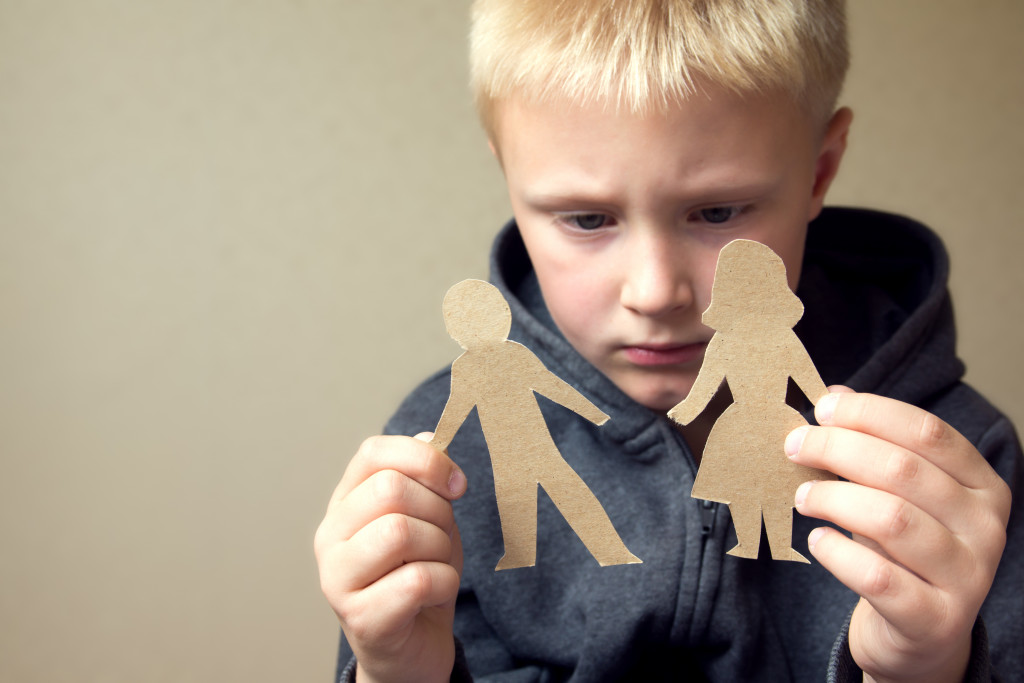It’s easy for parents to get easily wrapped up once they file for divorce. There are plenty of considerations involved, from hiring a divorce lawyer, consulting a child custody attorney, sorting assets, making financial arrangements, and other legal aspects.
Divorce is a critical family matter, and the welfare of the children will always get involved. In this situation, nothing is more important than preserving the children’s well-being. No matter their ages, children are likely to deal with the negative consequences of divorce. These include long-term effects such as poor academic performance, loss of interest in social activities, difficulty adapting to changes, emotional sensitivity, and other destructive behaviors.
Going through a divorce is a difficult time not only for the parents but also for the children. Each year, millions of children worldwide are facing family disruptions because of parental separation. When parents divorce, the effects vary on children, and most of them struggle with the transition. If you and your partner are planning to divorce, it’s important to consider how children will cope with the upheaval of the separation.
Delivering the news
Most parents freeze up at the taught of telling the kids about their separation. They’re fearful of how the children will react once they deliver the sad news. Some even choose to hide it in the fear of inflicting painful emotions on the children. The impact of informing the children about divorce often involves a mixture of emotions such as sadness, guilt, anger, confusion, worry, grief, and loyal conflicts.
Telling the children that you and your spouse will separate is one of the most painful things to do. Before telling the kids, consult a psychologist or child specialist. The role of these experts is to minimize the harmful consequences and emotional effects of divorce on children.
The professional will provide instructions on how and where to reveal the sad news in the least painful way possible, how the parents will conduct and present themselves with the children, and how the parents will manage problems without getting the children involved. They will also offer suggestions on how to divide the time between two households.
Difficult as it may seem, try to establish an empathetic tone while addressing the critical points of the separation. As much as possible, give the children an honest, but child-friendly explanation.
The children have the right to know why the parents are getting a divorce, so long-winded explanations will only cause confusion. Use simple yet honest statements, such as, “We don’t get along anymore.” Remind the children it’s natural for families to encounter conflicts, but it doesn’t mean they should stop looking out for each other.
Telling the children how much you love them evokes a powerful message, no matter how simple this may sound. Keep reminding them that you and your spouse will still be there for them, from helping with homework, going out on weekends, and fixing meals.
Surviving the grieving phase

For most children, a divorce can bring a feeling of intense loss, from losing a parent, the family unit, and the life they used to have. In this case, providing parental support will help children deal with the loss and make adjustments to the current situation by helping them cope, grieve, and process their emotions.
After informing the children about the divorce, encourage the child to express what they feel and listen with your full attention. You’ll never know if they have pent-up feelings they’ve been hiding from you. During the conversation, it’s natural for children to struggle to share their feelings. Help them find the right words by considering their moods and sharing your point of view.
Children will also feel hesitant to reveal their real feelings for the fear of hurting the parent. Encourage them to be honest and inform them their point of view is important and whatever they will tell you is okay. Allow them to express their blame for the divorce because letting them reveal their honest feelings will help them deal with the circumstances as quickly as possible.
Ensuring stability after the divorce
Although it’s better to teach kids how to be flexible, adjusting early to the new situation can be difficult. Help the children adjust to these changes by ensuring structure and flexibility in their daily routines.
Providing continuity and structure doesn’t mean the parent should observe rigid schedules or the parent’s routines be similar. Start by establishing regular routines in both households while maintaining communication with the children. This way, children will experience more stability and calmness even after the separation.
Remember that children feel secure and safer with household routines. Even they have to switch homes every now then, the parent should be mindful of the schedule of their bath, homework, and dinnertime.
Going through a divorce is a difficult time for parents and their kids. In this case, it’s important to establish ways to protect the children from any potentially damaging effects. Regardless of how the divorce turns out, parents should put their child’s well-being as their primary focus to help them transition into the new circumstances as smoothly as possible.

